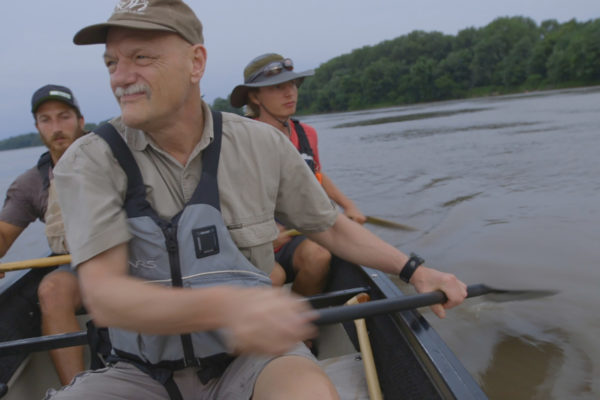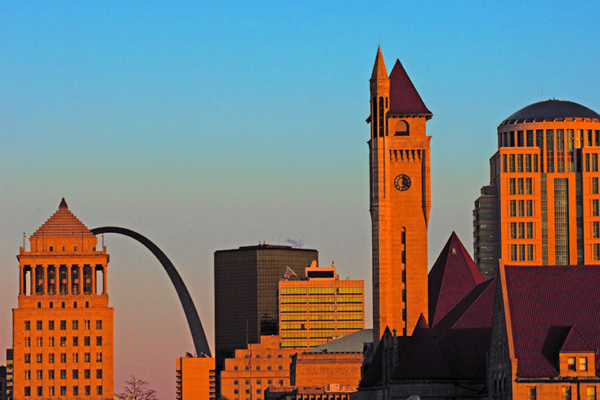Washington University in St. Louis senior Marissa Lerner studies science and engineering. Her friend and classmate Alexis Vidaurreta studies architecture and design. But they have both come to realize that our cities won’t be saved by better levees or cleaner air — they will be saved by people.
 “My impulse is that facts should drive decision-making,” Lerner said. “But people are everything. You may know the science or the design, but you need relationships and that sense of community to accomplish change.”
“My impulse is that facts should drive decision-making,” Lerner said. “But people are everything. You may know the science or the design, but you need relationships and that sense of community to accomplish change.”
Throughout their four years, both have studied how communities can build sustainable, resilient cities. Along the way, they have become close friends, sharing Cuban coffee, chatting in Spanish and biking St. Louis’ vibrant neighborhoods.
In the first installment of Class Acts, a series celebrating the outstanding graduates of the Class of 2019, Lerner and Vidaurreta share their respective visions for cities that protect people and resources:
Lerner: A systems approach to creating harmony between natural world, humanity
In her quest to “understand climate change down to the atomic level,” Lerner has studied hydrology, soil science, biogeochemistry, physics and math — lots and lots of math. But it was a political science course, “Environmental Justice” with Scott Krummenacher, lecturer of environmental sciences in Arts & Sciences, that taught her that environmental rights are human rights.
“As soon as I made that connection — that whenever you can exploit people, you can exploit the environment and vice versa — that’s when I realized this issue touches every single thing,” said Lerner, a Danforth Scholar who is majoring in environmental science in Arts & Sciences with a minor in systems engineering from the McKelvey School of Engineering. “And nowhere is that clearer than cities.”
According to the United Nations, cities are home to more than half the world’s people and produce more than 70 percent of global carbon-dioxide emissions. Lerner wants to help cities create systems that will both protect the environment and serve their residents.
“Cities are both a cause and a victim of climate change,” Lerner said. “But they also hold so much promise as essential starting grounds. They are economic and intellectual hubs, they can use their resources more efficiently and the local leaders have a clearer understanding of the local issues and closer relationships with people affected.
“Citizens may not understand the impact of national or global policies, but they can see and feel the changes in their cities,” she said.
As a Gephardt Institute for Civic and Community Engagement Civic Scholar, Lerner traveled to Quito, Ecuador, where she helped David Jácome Polit, chief resilience officer, implement Quito’s resiliency plan. Quito, like St. Louis, is part of the 100 Resilient Cities, an initiative founded by the Rockefeller Foundation to help cities better prepare for physical, social and economic challenges.
To Lerner, these issues are one and the same. For instance, in Quito the lack of affordable housing forced the city’s poor to build illegal makeshift settlements in the wildlife preserves of the Andean foothills. Beyond the lack of clean water and a functioning sewage system, these neighborhoods are vulnerable to earthquakes.
“So the question becomes how can you better support these populations in a way that doesn’t damage the environment,” Lerner said. “To say we need to fix the environment and then we can focus on health or homelessness or vice versa is incorrect. All of these issues are linked. You can’t look at one without looking at the others.”
These lessons have been reinforced in other academic and service activities. Lerner worked for Urban Harvest STL, which is addressing several environmental and community challenges through a single rooftop garden.
“From an environmental perspective, it’s great because it diverts stormwater, mitigates air pollution and attracts pollinators. But it also builds community and provides healthy, organic food for people who need it,” Lerner said. “To me, it’s the perfect example of what we can achieve when we start thinking about what our cities can do for us and how the natural world and humanity can live in harmony.”
And last year, Lerner was chosen to serve as a Washington University delegate to the 24th Conference of Parties to the United Nations Framework Convention on Climate Change in Poland. There, she heard directly from women, indigenous community leaders and others who have already lost their homes and livelihoods to environmental destruction.
She returned to St. Louis determined to make a new lifestyle change every month to improve the environment.
“I have levied a carbon tax against myself when I fly by making a donation to Urban Harvest STL,” Lerner said. “I also have given up beef and pork, and I carry around a mason jar and reusable silverware. I am engaging in direct personal action through Fossil Free WashU.
“As a systems engineer, I know we need to take a systems approach to climate change issues,” she said, “but every one of us, as individuals, has a role to play.”
Vidaurreta: Leveraging community to create sustainable, resilient cities
Growing up in Miami Beach, Fla., Vidaurreta witnessed how climate change was already challenging the built environment.
“Miami Beach is at the forefront of climate impacts,” Vidaurreta said. “Water is rising faster there than almost anywhere else in the country. King tides come up through the storm systems and corrode the infrastructure. It’s a mess — saltwater in the streets.”
Now, a senior architecture major in the Sam Fox School of Design & Visual Arts, Vidaurreta is working to integrate climate change action into broader programs of urban livability and resilience.
“Sustainability and livability advance one another,” said Vidaurreta, a Danforth Scholar who is also minoring in urban design in the Sam Fox School and in environmental studies in Arts & Sciences. “Sustainable places are more pleasant places to live. Lowering pollution increases the vibrancy of outdoor life; biking and walking improve health.
“But in St. Louis, we have a lot of competing priorities, and sustainability isn’t always at the top of the pile,” she said. “Here, I think the salient word is resilience, which includes sustainability but also captures a sense of environmental justice. Addressing public health disparities, focusing on social and racial equity — all of these things make the city stronger and better able to respond to stressors.”
The key to advancing change, she said, is communication. For example, a business owner might worry that new bike lanes reduce street parking. But research has shown that bike commuters stop more frequently along their routes, and spend more money in local shops. “These are outcomes and co-benefits that everyone likes,” she said. “It’s just a matter of communicating that.”
While interning with the university’s Office of Sustainability, Vidaurreta made the case for alternative transportation to students, faculty and staff by emphasizing cost as well as health benefits and environmental impact. “If you walk or bike, you save a lot of money on parking,” she said, smiling.
More recently, Vidaurreta worked on Trailnet’s Connecting St. Louis Plan. The nonprofit group aims to link local neighborhoods, business districts and cultural attractions with an on-street network of bikeways and sidewalk improvements.
“The advocacy and planning work are really intertwined,” she said. “I was responsible for processing public survey responses and integrating that data into the plan. We want to make sure that our recommendations reach underserved neighborhoods, prevent displacement and really benefit all of St. Louis.”
Community engagement also informed Vidaurreta’s capstone project in the Sam Fox School, “Project Porch,” which examined the Skinker DeBaliviere neighborhood just northeast of the Danforth Campus.
“I wanted to understand how social and environmental factors affect the way we experience a space,” she said. “How do you create a healthy neighborhood life? How do people get to know one another? What are the barriers to trust?”
To answer those questions, Vidaurreta began surveying students who reside in the area. The results were instructive. For example, she hypothesized that one key barrier might be the pace of rental turnover, but respondents placed more emphasis on the perceived lack of foot traffic.
“So now I’m trying to design small interventions,” she said. “People are constantly walking or biking through, heading to class. How do we capture all that presence? How do we think about it from a design perspective? How do we make it more tangible and useful?
“Getting out of your car and being present in your community is one of the best things you can do for the environment,” said Vidaurreta, who recently received the university’s Gerry and Bob Virgil Ethic of Service Award. “You don’t need to be loud about it. Just taking a certain kind of action can build momentum for others to change their behavior, too.
“It’s about living your values.”



